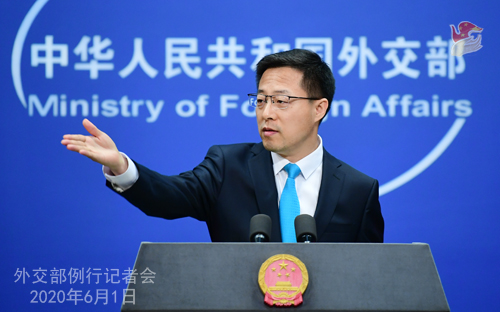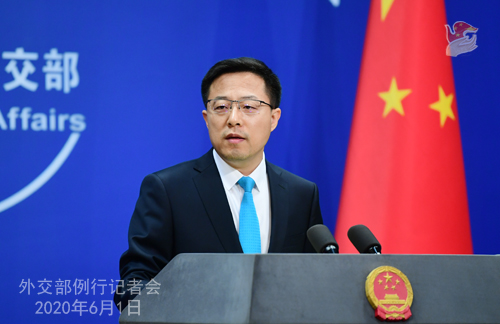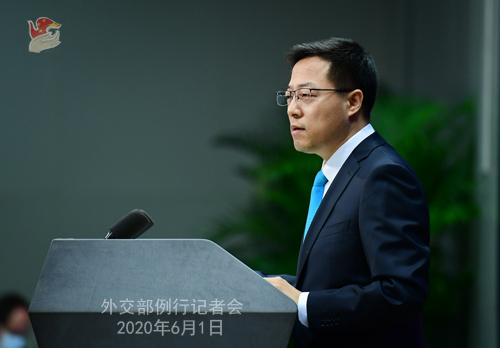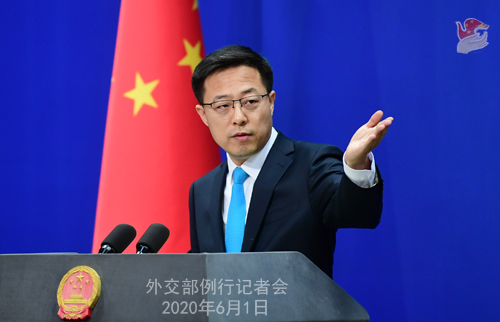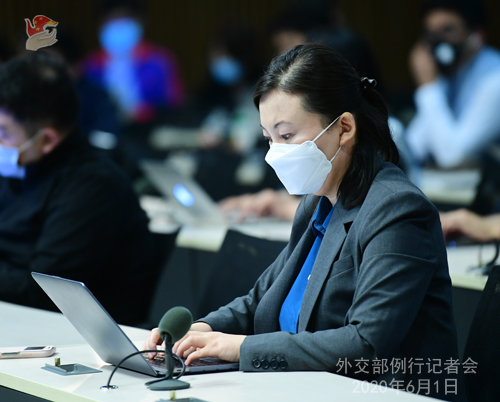| Foreign Ministry Spokesperson Zhao Lijian's Regular Press Conference on June 1, 2020 |
| 2020-06-01 22:59 |
|
CCTV: US President Trump in recent remarks accused China on such issues as the national security legislation for Hong Kong, the COVID-19 pandemic and trade issues. He announced that the US will begin the process of eliminating policy exemptions that give Hong Kong different and special treatment, suspend the entry of certain Chinese students and researchers, and study the differing practices of Chinese companies listed on the US financial markets. I wonder if China has a comment? Zhao Lijian: The US leader's allegations against China show a total disregard of facts. The measures announced gravely interfere with China's internal affairs and undermine bilateral relations and will be detrimental to both sides. China is firmly opposed to them. Hong Kong is part of China and Hong Kong affairs are purely China's internal affairs. The NPC is exercising its constitutional mandate in adopting the decision on establishing and improving a legal framework and enforcement mechanisms for safeguarding national security in the Hong Kong SAR. It is aimed to fill in a national security legislative gap in the HKSAR to better implement the "one country, two systems" principle and maintain Hong Kong's lasting stability and prosperity. No foreign country has any right or is in any place to interfere. The Chinese government is determined in safeguarding national sovereignty, security and development interests, implementing the "one country, two systems" principle, and opposing external interference in Hong Kong affairs. The gross interference by the US side in this matter runs counter to international law and basic norms of international relations and is doomed to fail. Cooperation between China and the US in the areas of economy, trade and education is for mutual benefit and win-win results. For some time, the US has been purposely oppressing Chinese companies for no good reasons other than a far-fetched excuse of national security. Now it is threatening US-listed Chinese companies with investigations and Chinese overseas students with visa restrictions. These severely violated the principle of market competition, went against the wish of the two peoples to carry out friendly exchanges, and will further undercut China-US economic relations and the social foundation for the overall relationship. COVID-19 is a common challenge faced by all mankind and calls for a concerted international response. The international community is on the same page in fighting against the virus with solidarity and cooperation and opposing coronavirus-related stigma. However, the US is still bent on blaming China and the WHO to distract the attention of its people from its own botched response to the pandemic. This practice shows no decency and will not succeed in hiding the truth from the public. China and the US both stand to gain from cooperation and lose from confrontation. China is committed to working with the US to develop bilateral relations featuring non-conflict, non-confrontation, mutual respect and win-win cooperation. In the meantime, China will resolutely defend its own sovereignty, security and development interests. No words or actions by the US that hurt China's interests will go without meeting firm counterattacks. The US will never have its way in containing China's development. We urge the US to immediately correct its mistakes, discard its Cold-War mentality, zero-sum game mindset and ideological prejudice, cautiously and properly deal with the relevant issues, and halt its steps down the erroneous path. CCTV: US President Donald Trump said at a press conference on May 29 that the incompetence of the Chinese government has caused suffering around the world. Why, he said, does China not allow people infected in Wuhan to travel to other parts of the country, while allowing them to travel freely around the world, including the US and Europe? What is your response? Zhao Lijian: What he said is totally untrue and shows no respect for the tremendous efforts and sacrifices made by the Chinese people in the fight against the virus. Since the outbreak of COVID-19, the Chinese government has taken the most comprehensive, rigorous and thorough prevention and control measures in a timely manner to contain the spread of the epidemics, effectively cut off the chain of transmission of the virus, and made a major contribution to global public health security, which has been widely praised by the international community. According to a study in Science, the measures taken by China have reduced the number of infected people in the country by more than 700,000. Facts are the best answer. The Chinese side locked down Wuhan on January 23, and there were no commercial flights or trains leaving Wuhan from January 24 to April 8. The three major US airlines announced the suspension of direct flights between China and the US on January 31, and on February 2, the US government banned the entry of Chinese citizens and foreigners who had visited China in the past 14 days. I wonder what he meant by saying China let infected people "travel freely"? According to published reports, epidemic statistics in several major Canadian provinces indicate that the virus was introduced into Canada by American travelers. A study by the Pasteur Institute in France found that the source of the viral strain circulating locally in France was unknown. None of the imported cases found in Russia came from China. The Australian Department of Health noted that only a very small portion of imported cases came from Northeast Asia. In Singapore, cases imported from China were less than one tenth of those from other countries. The Japanese National Institute of Infectious Diseases has argued that the outbreaks that have spread in Japan since March did not originate in China. Between China and the US, who is incompetent and guilty of inadequate response? Let the numbers speak for themselves. The US now has more than 1.8 million confirmed cases and more than 100,000 deaths, nearly 22 times the number in China. According to a research by Columbia University, which was published in a report on the New York Times website on May 20, the delay of government measures on social distancing has cost at least 36,000 lives in the US. If the United States had begun imposing social distancing measures one week earlier than it did in March, about 36,000 fewer people would have died in the coronavirus outbreak. And if the country had begun locking down cities and limiting social contact two weeks earlier, about 83 percent of the nation's deaths would have been avoided. At present, the situation in the United States is still very serious. People's lives are at stake. Scapegoating China will not drive away the virus or cure the sick. We urge those in the US who still want to label and politicize the virus to put their mind and energy into fighting the epidemics at home.
Bloomberg: First question, do you think that the rising tensions between the US and China will affect the implementation of the phase one trade deal? Second, we noticed that your colleague made a comment on Twitter in response to the White House spokesperson referencing the protests in the US. Does the MFA have an official comment on the protests that are happening in the US right now? Zhao Lijian: Regarding the first question, China has stated its position many times. Regarding your second question, we are following the latest developments of the situation following the death of George Floyd. "Black lives matter." Their human rights should be protected. Racial discrimination against ethnic minorities remains a social ill in the US. What is happening right now once again shows the seriousness of racial discrimination and violent law enforcement by the police, and the urgency for the US to address them. We hope the US government will take concrete measures to fulfill its due obligations under the International Convention on the Elimination of All Forms of Racial Discrimination to protect the legal rights of ethnic minorities in the US. China Review News: We noted that Africa has reacted very strongly to the death of the African American due to the violent use of force by a white police officer in the US. Chairman of the AU Commission and political leaders of some African countries have publicly condemned this in various ways. What is your comment? Zhao Lijian: African countries and people know what an unspeakable experience it is to be the subject of racial discrimination. They have never stopped their fight against racial discrimination and segregation. In response to the situation in the US, leaders of the AU and many African countries have called for justice against racial discrimination. Their voices represent the consensus of the international community and deserve the attention from the US side. China stands with the African side in their just calls and will work with the African side to firmly oppose all forms of racial discrimination, including inflammatory comments of racial hostility and hatred. China Radio International: To jointly fight COVID-19 and enhance cooperation in free trade, on May 29, China and ASEAN issued the China-ASEAN Economic Ministers' Joint Statement on Combating the Coronavirus Disease (COVID-19) and Enhancing ACFTA Cooperation. On the same day, the first event of Virtual Jakarta Forum on China-ASEAN Relations 2020 was held via videolink in Jakarta with a focus on China-ASEAN cooperation on COVID-19 and concerted efforts to build a community with a shared future for mankind. Under the current circumstances, China and ASEAN share even closer ties and cooperation. I wonder if you could comment on that? Zhao Lijian: Thank you for your attention on that. China and ASEAN countries have been working together to fight the virus. As early as February we held the Special ASEAN-China Foreign Ministers' Meeting on COVID-19, sending out a positive signal of solidarity among regional countries, which set an example for global cooperation. As the two sides work on an ongoing basis to contain the virus, we issued the said joint statement and held the said forum. While combating COVID-19, out of solidarity and cooperation, we are committed to maintaining stable industrial and supply chains and advancing socio-economic recovery and development, which demonstrates the high level of our mutual trust and collaboration. Currently, all countries are faced with the urgent task of containing the virus while recovering economic growth. China will continue working with ASEAN to seek stronger complementarity between the Belt and Road Initiative and ASEAN development plans, expand cooperation in trade and public health, deepen regional economic integration, build a "silk road of health", and inject new impetus into a closer China-ASEAN community with a shared future.
Macau Monthly: According to reports, Russian President Putin said on May 30 that there's little chance to maintain the New START Treaty signed by Russia and the US. Does China have any comment? Zhao Lijian: The extension of the New START Treaty, the important and only existing bilateral arrangement between the US and Russia on nuclear disarmament, has grabbed the attention of the international community. This issue bears on not only the Russia-US strategic security relationship but also global strategic stability. The US, with the largest and most advanced nuclear arsenal in the world, should earnestly fulfill its special responsibility in nuclear disarmament, actively respond to Russia's call of extending the New START Treaty, significantly slash its nuclear stockpiles, and create conditions for other nuclear states to join multilateral negotiations on nuclear disarmament. Xinhua News Agency: A group of Chinese medical experts have returned from Tajikistan on May 31. Can you tell us something about their work on the ground? Will China provide more assistance for Tajikistan? Zhao Lijian: Thank you for the question. The Chinese work team from Shaanxi Province to Tajikistan comprised of experts in foreign affairs, overseas Chinese affairs, medical treatment and disease prevention and control. During their 8-day stay in Tajikistan, the experts visited areas hit heavily by COVID-19 including Dushanbe and Khatlon Province, had meetings with Tajik officials of the Ministry of Health and Protection and sub-national authorities, visited the Municipal Infectious Diseases Hospital of Dushanbe and designated quarantine locations to have a comprehensive understanding of Tajikistan's medical system, discussed epidemic prevention experience and treatment methods with representatives of designated hospitals, carried out consulting and training programs and provided medical supplies and reading materials on COVID-19 to the Tajik side. The Tajik side highly commended the Chinese experts' good work and practical opinions. The Tajik government and experts thanked the Chinese government and people, and they believed that China's help demonstrates the high level of bilateral relationship and deep friendship between the two peoples. During their stay in Tajikistan, the experts also worked closely with the Chinese embassy. They shared COVID-19 knowhow via videolink with the Chinese communities including Chinese students, Chinese institutions and teachers at Confucius Institutes. They also distributed 3,000 health kits conveying loving care from the motherland. China and Tajikistan are friendly neighbors and comprehensive strategic partners. Upholding the vision of building a community with a shared future for mankind, China will continue supporting and helping Tajikistan to the best of our ability for an early victory against the virus. CNN: US officials and agencies claimed that foreign forces are influencing the domestic situation. National Security Adviser Robert O'Brien mentioned some Chinese social media users are gloating over what's happening in the US. Some are comparing the situation in the US with that in Hong Kong. According to a media monitoring company, some Chinese, Russian and Iranian social media accounts are extremely active in commenting what the US is experiencing. I wonder what's your response? Zhao Lijian: The remarks made by Mr. O'Brien and other US officials, as well as the conclusion made by the US institution, are just baseless. China doesn't interfere in other countries' domestic affairs. The whole world has watched as things unravel in the US. American politicians had better get their own house in order. China has a sense of right and wrong. We are opposed to all violent and illegal activities. We also hope that the US will not stay indifferent to the issue of racial discrimination. You mentioned some people's comparison between the protests in the US and the violence in Hong Kong. Their causes are completely different. During the disturbance over proposed legislative amendments in Hong Kong, hostile local and foreign forces flagrantly engaged in secessionist, subversive and terrorist activities that severely threaten national security, which are "Hong Kong independence" and violence in essence. As to the trigger for protests across the US, American media have made thorough coverage. Many people may want to ask this question: why does the US refer to those "Hong Kong independence" and black-clad rioters as "heroes" and "fighters" but label its people protesting against racial discrimination as "thugs"? Why did the US have so many problems with the restrained and civilized way of law enforcement by the Hong Kong police but have no problem at all with threatening to shoot at and mobilizing the National Guard against its domestic protesters? This double-standard way of behaving is so typical of the US. The reasons behind this are worth reflecting on and staying vigilant against.
The Paper: China and Singapore agreed in a joint statement on May 29 to launch a "fast lane" to facilitate necessary business and official exchanges between the two countries in early June on the premise of maintaining COVID-19 prevention and control measures. Could you give us more details? What other neighboring countries will China discuss with to establish similar "fast lane" arrangements? Zhao Lijian: Thank you for asking. China and Singapore are important partners to each other. Since the outbreak of COVID-19, the two countries have worked closely and supported each other at all stages. In early April, China's Vice Foreign Minister Luo Zhaohui and Permanent Secretary Chee Wee Kiong of the Ministry of Foreign Affairs of Singapore co-chaired the first video meeting between the two sides on COVID-19 to discuss epidemic prevention and control and bilateral practical cooperation in various fields. At that time, the two sides both expressed readiness to establish a "fast lane" at an appropriate time. After nearly two months of communication and preparation, the two sides announced at the second video meeting on May 28 that they would launch a "fast lane" in early June to facilitate necessary business and official exchanges between the two countries. Under this arrangement, business and official travelers can apply for visas after their applications, submitted by the companies or government departments to receive them in the destination country, are approved by competent authorities. After passing the health-screening before leaving their country and the quarantine procedures after their arrival, they will be quarantined for a shorter period of time and their whole stay in the destination country will be effectively managed, forming a closed loop to ensure safety. The China-Singapore fast-lane arrangement is an important measure to normalize exchanges and cooperation and support the resumption of work and production against the background of long-term epidemic prevention and control. As the first fast lane between China and Southeast Asian countries, it will be conducive to national economic and social development and the stability of regional and global industrial and supply chains. The first phase of the China-Singapore fast lane will be implemented between Singapore and six Chinese provinces (municipalities) including Shanghai, Tianjin, Chongqing, Jiangsu, Zhejiang and Guangdong. The two sides will gradually expand the implementation scope and discuss the gradual resumption of commercial flights between the two countries, depending on the circumstances. At present, the fast lane between China and the ROK has been implemented smoothly and yielding good results. The implementation of the fast lane between China and Singapore is on the way, and I believe it will achieve the desired goals. We are also ready to continue to explore similar arrangements with other countries. While doing a good job in epidemic prevention and control, we are also committed to resuming necessary people-to-people exchanges, providing support for the resumption of work and production as well as deeper cooperation in both countries, and contributing to the economic and social recovery and development of the region and the world at large. Beijing Daily: India will not let its "pride be hurt" in its latest border flareups with China, Defense Minister Rajnath Singh said. According to him, India has been following a clear policy of maintaining good relationship with neighboring countries while striving to make sure "tension does not escalate". Negotiations are ongoing between the two countries at the military and diplomatic levels. What's China's comment on the current situation in the China-India border area as well as remarks by the Indian side? Zhao Lijian: On border-related issues, China has been implementing the important consensus reached by the two presidents, strictly observing bilateral agreements, and committed to safeguarding territorial sovereignty and security as well as peace and stability in the China-India border area. Currently the overall situation along the border is stable and controllable. Between China and India, there are unimpeded channels for border-related communication in diplomatic and military fields. We believe the issues can be properly resolved after bilateral negotiations and consultations. Beijing Youth Daily: At a White House press conference on May 29, US President Trump said the US will be terminating its relationship with the World Health Organization because the WHO has failed to make the requested and greatly needed reforms. Do you have any comment? Zhao Lijian: We heard voices of opposition from many countries including US allies. The international community universally disagrees with the US selfish, responsibility-shirking behavior that undermines international cooperation in fighting COVID-19. In fact, over the past years, the US has been a habitual quitter who has pulled out from the UNESCO, the UN Human Rights Council, the Paris Agreement, the JCPOA, the INF Treaty, the Treaty on Open Skies, etc. Its latest withdrawal reveals once again its pursuit of unilateralism and power politics. As State Councilor Wang Yi recently pointed out, WHO is an international body made up of 194 sovereign states. It does not serve any particular country, and it should not defer to any country that provides more funding than others. In the face of COVID-19, those attempts to attack or blackmail WHO are negligence of human life, a challenge to humanity and sabotage of international cooperation that will surely be rejected by the international community. As a responsible major country, China will continue making efforts to support the WHO's leading role in global anti-epidemic cooperation. We call on the international community to further consolidate consensus in endorsing multilateralism, increase political and financial support for the WHO, and jointly safeguard global public health security. Global Times: A proclamation signed by US President Trump and published on May 29 accused the Chinese government of using its overseas students to acquire sensitive US technologies and intellectual property. Starting on June 1, Chinese students and researchers who seek to enter the US pursuant to an F or J visa to study or conduct research and have connections with the Chinese military are subject to certain restrictions, limitations, and exceptions. What is your comment? Zhao Lijian: I have given my response last week. This action is stark political persecution and racial discrimination and a grave violation of the legitimate rights and interests of Chinese students and researchers in the US. It runs counter to the openness and freedom the US claims to champion and the public commitment given by the US leader. It goes against the trend of the times in international talent exchange. This will gravely impact the normal cultural and personnel exchange between the two countries. We strongly condemn and firmly oppose this action. History has taught us that nothing will prevail over the will of the people. If someone attempts to "decouple" the two economies, wage a new Cold War on China, push China and the US towards conflict and confrontation, and sow estrangement between the two peoples, their efforts will only end up in vain. We urge the US to immediately stop using all sorts of excuses to wantonly restrict and oppress Chinese students and researchers in the US. It should immediately retract its wrong decision, and respect and protect the legitimate rights and interests of Chinese students in the US. Reuters: A group of Republican members of the US House of Representatives plan to unveil a bill this week to stop Americans investing in companies with ties to China's military, according to documents seen by Reuters. Do you have any comment on this? Zhao Lijian: I noted relevant reports. We urge those US politicians to rise above their bias and earnestly follow market principles. They should stop abusing the concept of national security to politicize economic issues, and stop unwarranted allegation and oppression against Chinese companies. We hope they will work to advance China-US trade cooperation and the two peoples' welfare. Macau Monthly: Russian President Putin has invited Chinese President Xi Jinping to attend the military parade in commemoration of the 75th anniversary of victory of the Great Patriotic War to be held on June 24 in Moscow's Red Square. Could you tell us more about this? Zhao Lijian: This year marks the 75th anniversary of the victory of World War II. As major victorious nations of WWII, China and Russia made important contributions to the victory. China supports Russia in holding celebration activities for the 75th anniversary of the victory of the Great Patriotic War. We will continue working with Russia and the rest of the international community to safeguard the fruits of WWII and the hard-won peace.
********************************************** Zhao Lijian: Today is International Children's Day. Children are the hope and the future. I would like to take this occasion to wish them happiness, health and progress. |
| |||||||||||||||
|
|||||||||||||||


